

English resource – LEARNING DESIGN by Paul G Moss. The Hill We Climb: the Amanda Gorman poem that stole the inauguration show. When day comes, we ask ourselves where can we find light in this never-ending shade?

The loss we carry, a sea we must wade. We’ve braved the belly of the beast. We’ve learned that quiet isn’t always peace, and the norms and notions of what “just” is isn’t always justice. And yet, the dawn is ours before we knew it. Somehow we do it. And yes, we are far from polished, far from pristine, but that doesn’t mean we are striving to form a union that is perfect. Scripture tells us to envision that everyone shall sit under their own vine and fig tree and no one shall make them afraid. We will not march back to what was, but move to what shall be: A country that is bruised but whole, benevolent but bold, fierce and free. So let us leave behind a country better than the one we were left.
Student voice and its role in creating cognitive dissonance: the neglected narrative in teacher professional development: Professional Development in Education: Vol 0, No 0. Why writing by hand can enhance your productivity. Feedback for Learning: Make Time to Save Time. Focused feedback from a trusted teacher or partner helps students learn.
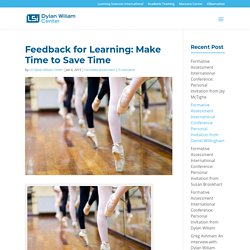
By Dylan Wiliam What Dance Teachers Know At Dreyfoos School of the Arts in West Palm Beach, a high school jazz dance class is in session. The teacher has organized the dancers so each student is partnered. Education Theory/Constructivism and Social Constructivism. "Constructivism is the philosophical and scientific position that knowledge arises through a process of active construction.
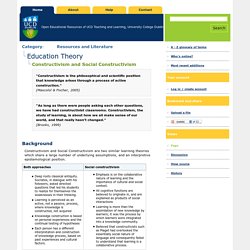
"(Mascolol & Fischer, 2005) "As long as there were people asking each other questions, we have had constructivist classrooms. Constructivism, the study of learning, is about how we all make sense of our world, and that really hasn’t changed. " Oxford vaccine: How did they make it so quickly? Conducting a Class (Interactive Delivery) Lectures are useful to convey knowledge at the basic levels of Bloom’s revised taxonomy i.e. remembering and understanding.
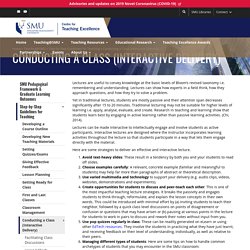
Lectures can show how experts in a field think, how they approach questions, and how they try to solve a problem. Yet in traditional lectures, students are mostly passive and their attention span decreases significantly after 15 to 20 minutes. Traditional lecturing may not be suitable for higher levels of learning i.e. apply, analyse, evaluate, and create. Sign in to your account.
Create a Growth Culture, Not a Performance-Obsessed One. Executive Summary Many C-Suite leaders are focused on how to build higher performance cultures. The irony, we’ve found, is that building a culture focused on performance may not be the best, healthiest, or most sustainable way to fuel results. Instead, it may be more effective to focus on creating a culture of growth.
Flipping the Classroom. “Flipping the classroom” has become something of a buzzword in the last several years, driven in part by high profile publications in The New York Times (Fitzpatrick, 2012); The Chronicle of Higher Education (Berrett, 2012); and Science (Mazur, 2009); In essence, “flipping the classroom” means that students gain first exposure to new material outside of class, usually via reading or lecture videos, and then use class time to do the harder work of assimilating that knowledge, perhaps through problem-solving, discussion, or debates.
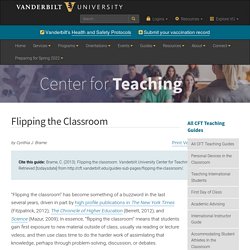
In terms of Bloom’s revised taxonomy (2001), this means that students are doing the lower levels of cognitive work (gaining knowledge and comprehension) outside of class, and focusing on the higher forms of cognitive work (application, analysis, synthesis, and/or evaluation) in class, where they have the support of their peers and instructor. What is it? Rosenshine Masterclass Captured. Free CPD!
In response to demand for my workshops and masterclasses on Rosenshine’s Principles of Instruction, I’ve recorded a screen capture of me talking through the slides I use for my one-day events.
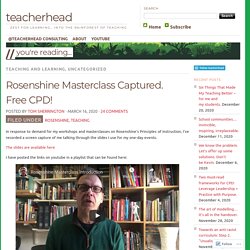
The slides are available here I have posted the links on youtube in a playlist that can be found here: There is 2 1/2 hours of material there so take your time to browse. If you would like to book me for in-school CPD please do – just follow the teacherhead-consulting tab at the top of this website. If you want bulk copies of the Rosenshine booklet email as@johncatt.com to discuss a discount offer. Sign in to Outlook. Three Reasons Classroom Practice Conflicts With Evidence On How Kids Learn. Over the last several decades, psychologists have unearthed a wealth of evidence on how children learn.
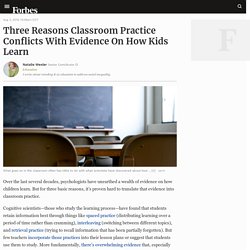
But for three basic reasons, it’s proven hard to translate that evidence into classroom practice. Cognitive scientists—those who study the learning process—have found that students retain information best through things like spaced practice (distributing learning over a period of time rather than cramming), interleaving (switching between different topics), and retrieval practice (trying to recall information that has been partially forgotten). But few teachers incorporate those practices into their lesson plans or suggest that students use them to study.
More fundamentally, there’s overwhelming evidence that, especially when students don’t know much about a topic, it’s best to provide information explicitly. The reasons for the disjunction between the worlds of education and science are complex. When introduced to evidence from cognitive science, many teachers eagerly embrace it. How to Design Online Courses That Are Full of Surprises. The following is the latest installment of the Toward Better Teaching advice column.
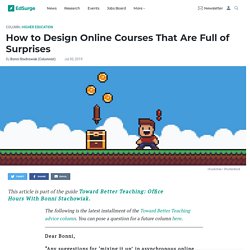
You can pose a question for a future column here. Dear Bonni, Why a third of every lesson is retrieval practice. I still see and hear people talking about revision being at the end of course.
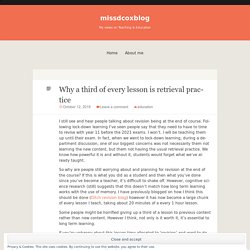
Following lock-down learning I’ve seen people say that they need to have to time to revise with year 11 before the 2021 exams. I won’t. I will be teaching them up until their exam. In fact, when we went to lock-down learning, during a department discussion, one of our biggest concerns was not necessarily them not learning the new content, but them not having the usual retrieval practice. European Film Factory : european platform for film education. Effective Educational Videos: Principles and Guidelines for Maximizing Student Learning from Video Content. Teaching + Learning - Right Question Institute. The Big List of Class Discussion Strategies. Start Here. UDL: Downloads.
Open University Innovation Reports. This series of help sheets is designed for people who are trying out distance and online education for the first time, and for teachers who have already taught at a distance and want to try something new.
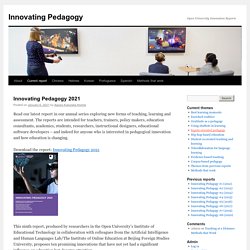
Each help sheet outlines one approach to learning at a distance and provides guidance on how to put this into practice. All the help sheets are based on approaches covered in past Innovating Pedagogy reports and take into account that students may have only limited access to technology and the Internet. The latest report in our annual series explores new forms of teaching, learning and assessment for an interactive world, to guide teachers and policy makers in productive innovation. Download Innovating Pedagogy 2020 This eighth report, produced in collaboration with the National Institute for Digital Learning (NIDL), Dublin City University, Ireland, proposes ten innovations that are already in currency but have not yet had a profound influence on education in their current form.
Unit 1: Teach Narrative Writing With The New York Times. Welcome to our first writing unit of the school year. Below you’ll find a detailed description of each element, as well as ways to put them together to make your own custom writing unit. To learn more about other writing units, visit our writing curriculum overview. Stories can thrill, wound, delight, uplift and teach. Telling a story vividly and powerfully is a vital skill that is deeply valued across all cultures, past and present — and narrative writing is, of course, a key genre for literacy instruction at every level. Using Desirable Difficulties to Enhance Learning, Dr. Robert Bjork. Sites everyone should know about - Educating Holmes. *Everybody* knows about great sites like Times Table Rockstars, Spelling Shed and Read Theory.
We *all* know about White Rose & the NCETM, the Literacy Shed and Testbase. And if you haven’t checked out No More Marking yet, then I recommend you bookmark this post, go check it out and come back to read this post later. In this blog post, I’m going to share links to a few other sites which I’ve found useful. I hope you find them helpful! (Re)imagining and Remaking Teacher Education; professionalism, capability, and at-distance Learning in a changed world – IFTE. Ocean Vuong — A Life Worthy of Our Breath. Krista Tippett, host: I interviewed the wise and wonderful writer Ocean Vuong on Sunday, March 8 in a crowded, joyful room full of podcast makers in Brooklyn. We’d all heard of the Coronavirus by then. But none of us would have guessed that within a handful of days such an event would become unimaginable.
8 Surprisingly Simple Tips That Will Make You a More Efficient Writer. How philosophy can help our mental wellbeing. University College Dublin’s Dr Emma Farrell and Dr Áine Mahon discuss how philosophy can help society live well in the face of forces beyond our control. Teaching Strategies. 9. Useful resources for Picturebook enthusiasts. Learning to teach starts with “learning to look” – InFo-TED.
A ‘viewing frame’ for observing teacher educators and teachers Introduction How student teachers learn to teach has been dominated by the idea that the “knowledge of teaching is acquired and developed by the personal experience of teaching” (Munby, Russell, and Martin (2001, p.587). Guided Discovery as a Teaching Method. The term “Guided Discovery” refers to a teaching and learning environment where students are actively participating in discovering knowledge.
Guided Practice (I do We do You do): Examples & Definition. Quick Definition of Guided Practice. Creating multimodal texts. Multimodal texts combine two or more modes such as written language, spoken language, visual (still and moving image), audio, gestural, and spatial meaning (The New London Group, 2000; Cope and Kalantzis, 2009). Creating digital multimodal texts involves use of communication technologies, however, multimodal texts can also be paper based, or live performances. The importance of self-reflection. University of Hertfordshire. Guiding and assessing student teachers These stories are about assessment (judgments around pass/fail); guiding student teachers’ teaching; providing learning opportunities for student teachers; and teaching student teachers. National Education Systems. What do teachers need to know about Cognitive Load Theory? iPads in schools: a blessing or curse? Resources. The Irish Literary Times.
Core reflection and Multi-Level Learning (MLL) – Korthagen. Innovative Pedagogies for Powerful Learning - Compilation of innovative pedagogies. Collaborative Teaching by @education_maria. Black and Wiliam 1998 - The Teachers Toolbox. The Power of Advertising Slogans. Active Learning Strategies. Learning About Learning & the Brain - Interview with Neuroscientist Mary-Helen Immordino-Yang. Home / Twitter. The 10 features of highly effective curriculum planning: A guest blog – Reflections in Science Education. Learning spaces. How to cope with stress? The stress-inducing cognitions of teacher trainees and resulting implications for teacher education: European Journal of Teacher Education: Vol 0, No 0.
Dialogic Teaching - Robin Alexander. Agile Portugal 2017 - Agile-based Active Learning. International Teacher CPD Report. Cognitive Load and Active Learning. ‘The best’ schools in Ireland? Give me a break. Letter to My Younger Self. No, inquiry learning will not keep kids in maths class. Why we need to reconsider the value of the virtual classroom. Why Do Some People Love Reading? Grades versus comments: Research on student feedback
If we’re serious about changing the world, we need a better kind of economics to do it. Wealthy students and educational attainment. Connected Educator. 10 Best Dystopian Novels for Writers. Bloom goes boom! Ideas for better teaching. @teacherhead blog collection. 10 Techniques for Retrieval Practice. 8 Fun Ways to Help Your Students Collaborate in the Classroom. How I Use Fishbowl Discussions to Engage Every Student. 5 Tips for Classroom Management in Middle and High School. The growth mindset – Part 1. Schools love the idea of a growth mindset, but does it work? Why your child will benefit from inquiry-based learning. How to boost pupils’ learning? Stop relying on hunches and use research instead. Exploring Perspectives on Assessments: Learning from Research and Practice. - edmond.behan - Gmail.
National Forum Ezine #2 - National Forum for the Enhancement of Teaching and Learning in Higher Education. The Sunday Times Audible Short Story Award. What can one teacher really do about trauma? – Unconditional. /en/Good-Practice/Videos/#161622396. Boys don’t try? Why so many male students are falling behind at school. Letters From a German Soldier in WWI to his Mother. Top Tips for teaching poetry – The Poetry Society. Top Tips for teaching poetry – The Poetry Society. Author John Steinbeck on Falling in Love: A 1958 Letter. Inter-disciplinary curriculum: why is it so difficult to develop? (part two) – Professor Mark Priestley.
Ideacamp. 19 Student Engagement Strategies You Need to Know. What makes a poem … a poem? - Melissa Kovacs. Getting started with Reflective Practice. The Pedagogy Postcard Series: All in one place. Great Lessons 1: Probing. We Need To Pop Differentiation Bubble! UDL: Research Evidence. Blog of the week. Questioning for Confirmation… and then Challenge.